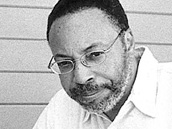Poetry, Fiction and Sundry Reviews
George Elliott Clarke
Monster
by David Clink
Toronto, ON: Tightrope Books, 2010
71 pp., $15.95
Gospel of the Living Dead: George Romero’s Visions of Hell on Earth
by Kim Paffenroth
Waco, TX: Baylor University Press, 2006
195 pp., $30
It was in 1985 that I first saw a zombie film that bothered me. It was likely an Italian picture, and I only remember that ranks of ‘the walking dead’ were successfully mutilating and gobbling down scared-to-death but insufficiently resourceful humans. It was in 1992 that I viewed the film that started the contemporary craze for – or interest in – the zombie as the most frightening monster of our time. I refer to Italian-American director George A. Romero’s Night of the Living Dead (1968).
The flick is terrifying in its black-and-white simplicity: Zombies will attack, implacably, even those they knew and loved in life, and reduce them to meat, unless they are pitilessly and fatally lobotomized, i.e., in effect, decapitated. Before looking at Monster, David Clink’s sophomore collection of poetry, I want to eye Kim Paffenroth’s Gospel of the Living Dead: George Romero’s Visions of Hell on Earth.
Published in 2006, Paffenroth’s academic study of Romero’s zombie flicks is disconcerting in its own right, for it is an unexpectedly – if only subtly – Christian reading of the films. Ironically, however, as the author notes in his Introduction, Romero’s “Dawn of the Dead (2004) was the first movie to edge Mel Gibson’s The Passion of the Christ (2004) – another low-budget movie with plenty of gore and no big stars – out of the number one place in box-office sales.” For Paffenroth, Romero is an American Gothic filmmaker whose vision is indebted to the Renaissance Italian poet Dante Alighieri’s epic, The Divine Comedy.
Indeed, zombies resemble, says the author, Dante’s description of the damned as “the suffering race of souls who lost the good of intellect.” In other words, these ghouls are idiotic gluttons; they are examples of human beings who are slaves to appetites, unguided by reason or intelligence. To put it another way, those who only care about stuffing their guts or satisfying other physical needs, even when they are not hungry, thirsty, weary, sex-starved, et cetera, act just like zombies. Worse, zombies are unproductive parasites, consuming other beings, even when their cannibalism has no purpose. Zombies eat people, but are never satisfied by what they consume. They are emblems of greed—and types of the filthy rich who just want more, more, more, and don’t care what dirt they must do to achieve it.
For Paffenroth, Romero dissects human nature, sin, and hell, showing us that hell is really a place where the sinful continue to sin, but without any rationale or pleasure. After analyzing Romero’s zombie flicks up to Land of the Dead (2005), Paffenroth concludes, “Zombies will always be the nightmare we love to hate, and the painful wake-up call from our sinful reveries, one that we dread as much as we need.” (Paffenroth refers frequently in his notes to the great, Halifax, N.S.-based, literary critic, John Fraser, who has written brilliantly about violence and horror in art.)
Clink’s Monster is a horse of a different colour of fish. The mixed metaphor is deliberate, for the Toronto poet is interested in “shapeshifters,” including “one / who became an amusement park… / his mouth a Ferris wheel, his arms the midway….” As much as Clink reworks myths and legends, he is also keenly aware of how ‘monstrous’ our natural desires and processes are: “Saltwater on skin: / we can taste its bitterness, even as we explore / each other, these two new worlds we inhabit, / as we lick each other clean with our craving.”
Some environmentalists argue that humans are rogue creatures, savage parasites, wantonly wasting habitat and destroying other animals, to satisfy unnatural and unsustainable needs. There’s a trace of this argument in Clink, but also outrage at our vain pretense to immortality. “Putrefy. No one can recognize you now…. // Fester for awhile—perish at the thought / everyone alive will outlive you. // Somewhere there are people baking, / transforming ingredients, / combining / eggs, flour, and assorted fruit into flaky pastries. // Rot is the furthest thing from their minds.”
Monster is a scintillating, ‘dark’ collection, and its vivid poignancy is related to its precision in diction and form. “Come closer / and accept the blackness….”






No Comments so far ↓
There are no comments yet...Kick things off by filling out the form below.